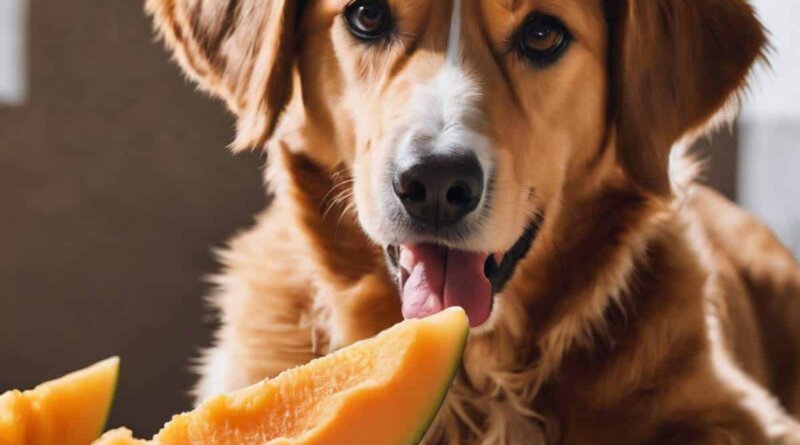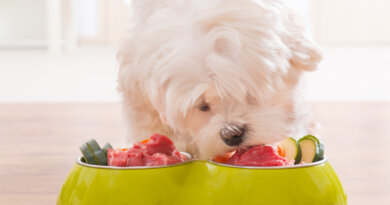Can Dogs Eat Cantaloupe? Is Cantaloupe Good For Dogs?
To keep the lights on, we receive affiliate commissions via some of our links. Our review process.

Cantaloupe is a tasty fruit that many people enjoy. It is often found on the breakfast table, in fruit salads, and makes for a juicy, sweet snack on a hot day. Because people enjoy this melon so much, the question often arises, “Can dogs eat cantaloupe?” The good news is that it can be a nice treat for them in small amounts. Cantaloupe is safe for healthy pups, but there is more to it than a simple yes or no. As with any food, owners must be cautious to ensure their pet is getting proper nutrition and not overdoing treats. We’ll get into more detail about dogs eating these orange melons.
Can Dogs Eat Cantaloupe?
Yes, generally speaking, a healthy dog can eat cantaloupe. Melon should only be served in small quantities and should not be something a pup eats daily. This fruit is not toxic, but there are a few precautions owners need to take, which we’ll discuss below.
The cantaloupe melon belongs to the same family as cucumbers, squashes, gourds, and pumpkins. It is also sometimes referred to as muskmelon. Melons like cantaloupe are called pepos. They are large berries with firm rinds, multiple flat seeds, and sweet, juicy flesh. Ideally, you should give your pup fresh melon. You can serve it cut up into small pieces, mashed, or frozen.
Fresh fruits are high in sugar, so you should only feed them to your furry friend in strict moderation. A good general rule of thumb to keep in mind is that canines should only get 10% of their daily intake of calories from treats. Still, dogs shouldn’t eat 10% of their calories from fruit every day. That is unsafe and can cause some uncomfortable side effects.
Even though this fruit is safe for dogs when given in moderation, your pup is sure to encounter unexpected dangers throughout its life. Pet insurance can reduce the financial burden so you can focus on your dog’s health in an emergency.
Is Cantaloupe Good For Dogs?
Cantaloupe has several health benefits for dogs. For starters, melon is high in water content, 90%, so adding extra moisture to your dog’s diet is helpful. It’s also high in fiber, aiding the digestive process. This melon is low in calories and contains no cholesterol or fat. Along with that, it’s full of vitamins and minerals.
6 Benefits Of Cantaloupe For Dogs
- In particular, cantaloupe contains high amounts of vitamin C. Vitamin C is an antioxidant that supports cell health and helps stop cell damage. Antioxidants also fight free radicals, which are harmful to cells.
- It also contains vitamin A, which supports the immune system and skin, bone, and eye health.
- Cantaloup is rich in potassium, which supports heart and muscle health, healthy blood pressure, and helps with muscle control.
- It also contains folate, niacin, calcium, copper, zinc, choline, phosphorus, and other nutrients that support whole-body health.
- Cantaloupe contains high levels of beta-carotene. In fact, it contains more of this carotenoid than most other yellow and orange-shaded fruits. Beta-carotene helps give these melons their orange color but is converted into vitamin A once it digests. Beta-carotene also fights free radicals and supports the immune system.
- The melon’s natural fiber content helps support digestion and manage weight, as fiber makes dogs feel full for a longer stretch of time.
While melons do have nutritional benefits for canines, it’s essential to point out that they should receive everything they need from high-quality, well-balanced dog food. Adding fresh fruits like melon to their diet can be a nice treat, but it should not replace their regular dog food. If you are concerned that your pup’s nutritional needs are lacking, discuss these worries with your veterinarian and a pet nutritionist before trying to supplement with fresh fruits and vegetables.
Can Dogs Eat Cantaloupe Rind? What About The Seeds?
No, the rind is too fibrous and tough and presents a serious choking hazard. The same is true for the seeds. Always remove all rinds and seeds from any melon variety you feed to your pet. Should your pet eat large chunks of rind and not choke, these can cause serious intestinal blockages.
Can Puppies Eat Cantaloupe?
Puppies can safely eat a bite or two of cantaloupe, but it’s best to avoid this food if possible. A puppy’s digestive tract and system are still developing, and introducing new and unusual foods, like melons, that are not part of their regular diet can cause digestive upset. It may be harder for puppies’ digestive tracts to work through the fruit than in adults.
Along with that, the high sugar content is not beneficial to puppies. They do much better on well-balanced, puppy-appropriate treats. So, if your curious puppy wants a bite as a one-time or very occasional treat, that is okay, but it’s safer to avoid feeding melons to your puppy until you are sure their digestive system can handle it.
Can Cantaloupe Be Bad For Dogs?
While this food is safe in small quantities, melons can potentially be harmful to canines. If a small-breed dog or puppy eats seeds or bits of rind, they are at risk for an intestinal blockage, which can be very severe and even fatal in extreme cases. While larger pups may not be as at much risk from the seeds, the rind is a choking hazard and poses a risk of obstruction for any size pup. The high sugar content can also put canines at a higher risk of developing conditions like diabetes and obesity. Any pet suffering from a medical condition should only be fed melon if your vet has okayed it.
Pups who have overeaten melon may experience some stomach distress and pain. Overindulging can lead to a distended stomach, stomach pain, diarrhea, vomiting, poor appetite, and lack of energy. The high sugar content, combined with the fiber, can cause painful diarrhea in canines. Doggie diarrhea is unpleasant for everyone, so it is best to avoid this fruit if your pup has any adverse reaction after eating it.
How To Feed Your Dog Cantaloupe
Always look for fresh fruit. Plain fruit is best. While it can mix well with other fruits, vegetables, and food, make sure it has not been prepared with any other added ingredients like extra sugar or artificial sweeteners. Some of these substances, like xylitol, are incredibly toxic to dogs and are best avoided at all costs. Make sure that the fruit you pick is ripe. Fruit that is too green is hard to digest and can cause stomach pain. Fruit that is too ripe may be spoiled and be at risk for bacteria.
- Cut the melon, remove all seeds, and rind first. You can wash the melon and then cut it into small bite-size pieces appropriate for your dog.
- You can also give your pup melon as a smoothie, mashed, or even frozen. If serving frozen, ensure the pieces are small and do not get so hard when freezing that they pose a choking hazard. Some owners like to make their pets fruit smoothies using plain Greek yogurt and fresh fruit. The melon can also be pureed and frozen, offering a nice refreshing treat.
- Always observe your dog closely when they first eat a new food like melon. You will want to observe for any adverse reaction and limit that first experience to just a bite or two. Watch for stomach pain, constipation, diarrhea, vomiting, and other signs that your pup may not handle this food well.
Don’t give your dog a big slice of any melons. A full slice is much too large a serving and poses a choking hazard. Always feed your dog appropriately sized pieces of fruit.
What Other Fruits Can Dogs Eat?
Canines can safely eat other melons like honeydew and watermelon. They can also chow down on fresh produce like apples, mangoes, strawberries, blueberries, pineapple, bananas, raspberries, and pears. Canines can even eat some citrus fruits, like oranges, in small amounts. You can learn more about fruits that are safe for dogs to eat in our guide here.
Other Treat Options
Along with fresh produce, owners can consider plenty of other treat and supplement options for their dogs. Many pups enjoy vegan treats, freeze-dried meat treats, air-dried treats, and frozen treats on a hot day. Some owners may prefer to make homemade organic treats so that they can know first-hand what ingredients are going into them. Of course, most dogs love peanut butter, so that is always a popular option.
Along with treats, some pets can benefit from supplements. Many canines with bone and joint issues and painful conditions like arthritis may want to consider a joint supplement. Other supplements help support pets who suffer from allergies or anxiety. For those dogs, CBD dog treats are sometimes a helpful option. Be sure to discuss any supplements with your veterinarian before adding them to a pet’s diet.
Wondering What To Put In Your Dog’s Food Bowl?
Picking the best dog food can be a tricky process. There are a growing number of options added to the dog food market every day. Many owners are starting to prefer fresh dog food made from human-grade ingredients. These foods can be delivered right to your door and are easy to serve, offering top nutrition without the trouble of making your dog fresh meals every day. The Farmer’s Dog, Ollie, and Nom Nom are some of our top picks. Always discuss any dietary concerns you have with your veterinarian. It is best to work together to come up with a plan to ensure your dog gets their nutritional needs met.
Tagged With: Food Safety




